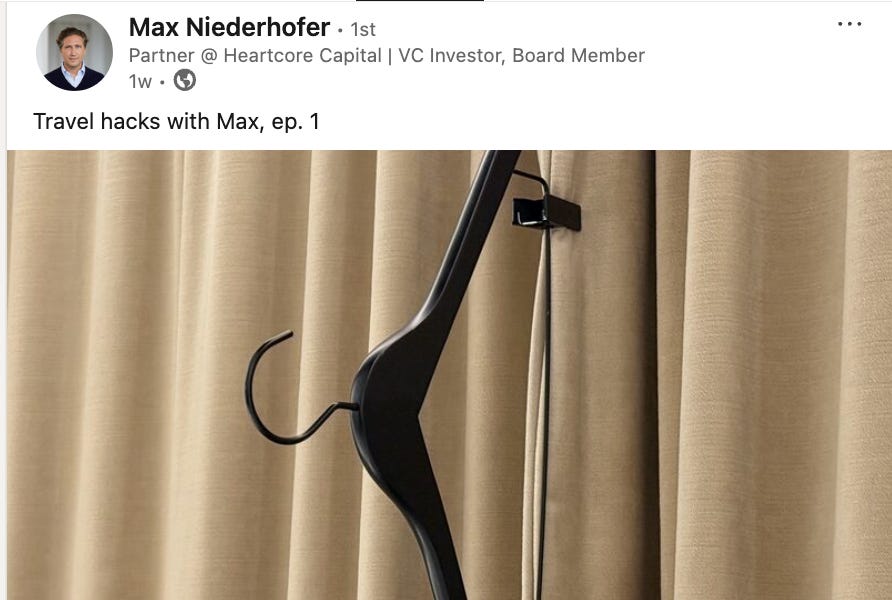Travel innovation creates tension between our expectations and desires. In this issue, I explore some of those contrasts: between AI-driven efficiency and humanity, between traditional players and new innovators, between complex technologies and simple solutions.
I wish you all a Merry Christmas and Happy Holidays. Thank you for being a Travel Tech Essentialist in 2024 and my best wishes for 2025. May it bring success that really matters.
grateful Tourism Technology Association Sponsor this newsletter:
Recognizing the challenges faced by start-ups and SMEs, Travel Technology Expanded its advocate membership Provides access to monthly webinars, networking and innovation policy newsletters. In May 2025, attend the Travel Tech Startup Summit in Washington, D.C., followed by the Policy and Innovation Showcase. Learn how the Advocate Program can help your business thrive.
Last month, I shared my 21 extremely specific travel technology predictions for 2025and you vote on which predictions you think will come true and which predictions you want to come true. The results reveal interesting tensions between industry expectations and aspirations.
Creating “tourism-free zones” in major cities was the only area that ranked highly in both likelihood (33%) and desirability (39%). Otherwise, your expectations versus what you want tell an interesting story. The industry anticipates structural changes (power shift to Asia, AI customer service) but hopes for human-centered innovation (empathic pricing, unforgettable experience guarantees, travel advisor market). For example, while 31% believe AI will replace traditional customer service, only 13% expect this to happen.
Go here to find Full results and analysis.
Speaking of predictions, let’s take a look at how we’ll actually find travel information in the future. Christian Watts suggests that we are moving towards a hybrid future that combines three core formats: LLM (providing immediate, accurate information), Google-style search (providing reliable third-party sources) and video platforms (providing inspiration and how-tos). Each has its challenges. LLM still occasionally hallucinates, Google feels increasingly labor-intensive (“Why click on multiple links?”), and video platforms like TikTok prioritize entertainment over accuracy. Christian says the future is likely to be a merger of all three, with AI agents acting as gatekeepers for personal information, filtering and presenting data in our preferred formats. Read+.
To get smart answers, you often need to ask some really stupid questions — Rory Sutherland
-
Why is there business class on the plane instead of “family class”?
-
Why do we still book flights through the airport instead of the actual destination?
-
Why do hotels still have fixed check-in/check-out times?
-
Why can’t I subscribe to a hotel chain for a fixed number of days per year like I subscribe to Netflix?
-
Why do I need travel insurance every time I travel instead of an annual plan like home or car insurance?
-
Why would the rental car company penalize me for a one-way trip when it might actually help reallocate their fleet?
What “stupid” question are you asking?
Marriott just acquired Postcard Cabins (formerly Getaway), marking the first time a major hotel chain has actually acquired a glamping company rather than just partnered with one. Nick Purslow, founder and CEO of Posh Outdoors, wonders if Marriott really understands the appeal of glamping. The old hotel playbook may no longer work. In glamping, it’s not about having a big brand, it’s about creating amazing experiences and Instagram-worthy spots. If the big hotel chains want to succeed in this space, they may need to do more listening than teaching. Read+.
If I had to bet on someone to create a world-class experiential destination, I would choose someone like Isaac French, Ben Wolff, Blake Smith Smith and Irene Wood rather than hotel chain developers every day of the week. —Nick Purslow
Y Combinator released their Winter 2025 Startup Request. Their priorities:
-
Government Software (Leveraging Artificial Intelligence to Make It Really Work)
-
US manufacturing (following in Tesla’s footsteps)
-
Public safety technology (e.g. license plate cameras already solve 10% of crime in the U.S. and plan to solve 25% of all crime by next year)
-
Space Companies (This isn’t about rockets. It’s about what happens when launching satellites becomes as routine as shipping containers)
-
Stablecoins (building infrastructure for banks and businesses)
-
chip design artificial intelligence
-
Next generation fintech (built on new infrastructure like Stripe)
-
AI-powered engineering tools (making PhD-level tools accessible to everyday engineers, government workers, and small business owners)
-
Startups capable of creating “a million jobs” only need humans, not artificial intelligence.
There are some huge opportunities arising from this: Huge deficits create a huge inflection point for government software startups (pressure to cut costs is greater than ever); as robot costs fall, U.S. manufacturing becomes strategic again ;While most agencies are focused on consumer AI, government agencies may be the trillion-dollar customers that no one is paying attention to.
a16z invites 50 partners to share Their biggest ideas in tech 2025. Here are some highlights:
-
Consumer apps shift from AI data collection to “AI in action”
-
“AI brain” revolution, AI can understand your preferences and past behaviors
-
Customer service shifts from traditional support model to “artificial intelligence + manual verification”
-
They argue that AI does not replace workers but helps small businesses compete with larger companies
-
AI can help government services really work by automating paperwork and bureaucracy
-
Every white-collar worker might get an AI co-pilot to handle daily tasks
First, some background information: Quantum computing uses the principles of quantum mechanics to perform complex calculations with exponentially more processing power than classical computers. For travel, it can bring new solutions to challenges, such as optimizing flight routes, instant rebooking during disruptions, improved weather forecasts or enhanced safety measures.
A (somewhat dense) UK Ministry of Transportation Report It is predicted that by 2035, quantum technology will create up to 8 billion pounds in value for the British transportation industry. Applications range from reducing the cost of congestion (£2.8 billion per year through quantum-powered traffic management) to enhancing cybersecurity. Quantum sensing technology could be commercialized within five years, allowing for better underground mapping and autonomous navigation in environments where GPS is unavailable.
The first episode was great. I want more!
Getting off a plane can be chaotic, with passengers dealing with stressful connections, walking back to collect their luggage, and crowding the aisles. Although airlines have improved boarding efficiency, disembarkation is still lack of order. Some airlines, such as Spain’s Vueling, have introduced row-by-row deplaning, but at most it’s still a free-for-all. Simple habits like letting the row in front of you exit first or packing up quickly can make the process easier for everyone. Read + Wall Street Journal.
Reach a focused audience of travel technology professionals by sponsoring the Travel Technology Essentialist newsletter. If you are interested, please fill in this form learn more.
If you’re a startup looking to raise a round of funding (from pre-seed to Series D), I can help (for free). Tourism Investor Network is a private platform where I recommend innovative travel startups to investors and innovators. If you are interested, please start from fill in this form.
→ Explore 1046 open positions Tourism Technology Essentials Recruitment Committee
📩 For monthly updates on the latest roles, please subscribe Travel Technology Work Newsletter
💼 Employers: If you would like to list your job here, Fill out this quick form
If you like Travel Tech Essentialist, please consider sharing it with your friends or colleagues. If you haven’t subscribed yet, please join us here:
As always, thank you for trusting my inbox.
Mauricio Prieto









